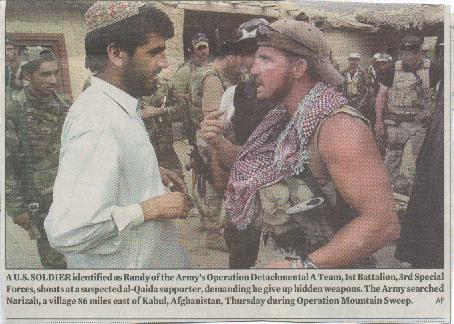
September 6, 2002
East Meets West
The above photo appeared on the front page of Investor's Business Daily on Wednesday, August 28. It is credited to the Associated Press and was captioned as follows:A U.S. SOLDIER identified as Randy of the Army's Operation Detachmental A Team, 1st Battalion, 3rd Special Forces, shouts at a suspected al-Qaida supporter, demanding he give up hidden weapons. The Army searched Narizah, a village 86 miles east of Kabul, Afghanistan, Thursday during Operation Mountain Sweep.
Of course things aren't always what they appear to be. But at the same time, keeping in mind that appearances can be deceiving, a great deal can be learned from one's senses and one's instincts. Often when we are told not to believe our eyes, it is because we are being lied to. The phenomenologists believed it is only through our minds that we know anything. So as an experiment, if we go "to the things themselves," what does this picture tell us?
It certainly doesn't fit with the American media image of the present encounter between the great civilized Americans and the backward -- nearly stone age -- fanatical Middle Easterners. In fact, the images for those stereotypes are nearly perfectly reversed in this photograph. The Afghan doesn't look like a dangerous, fanatical "Al Qaeda supporter." In fact, he looks quite civilized and refined, and seems to be looking quizzically at an American who appears to be in the grip of a fit of rage. In contrast, it is the American who looks savage and barbaric. Is this how the rest of the world sees Americans?
In an editorial in The Washington Post, Jimmy Carter said, "Formerly admired almost universally as the preeminent champion of human rights, our country has become the foremost target of respected international organizations concerned about these basic principles of democratic life."
Many actions of the present government, Carter says, "are similar to those of abusive regimes that historically have been condemned by American presidents."
And while we are on the subject of repressive regimes, a report in Intervention Magazine on George W. Bush's recent visit to Pittsburgh said, "When Bush came to Pittsburgh on Labor Day, the Constitution left town."
"Americans who support Bush and his policies can raise signs in his praise and line the streets when his limousine passes by," the article said. "Americans who do not support Bush and his policies must stay far away from the president by judicial decree or risk arrest."
On observance of the one-year anniversary of September 11, Richard Cohen in The Washington Post quotes a former New York City official who was in office one year ago as saying, "The government let us down. The government should have known something was coming. The government should have done something. I lost a lot of good men. What people don't know, the best died that day. The best men we had."
-- By David Cogswell